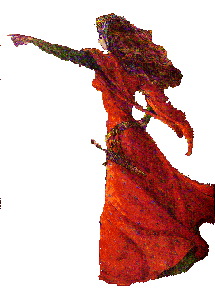

We can see a lot of parallels with Biblical Israel. For instance, the Biblical Barak lived in a time when Israel was at war with the Caananites of the northern part of the Land of Israel. He was afraid of them--so afraid that he told Devora the Prophetess that he would not face them without her. The Caananites had a mighty armored military with 900 iron chariots, (reminiscent of the Syrians' enormous tank corps of our time). (Egypt had only had 600 chariots.) Israel had no chariots and few weapons, for Jabin, the king of the Caananites had declared it illegal for the Israelites to forge weapons. Barak was afraid; he would have buckled. Devora told him that she would go, but the credit for the victory would go to a woman rather than to him. The song of Devora essentially says there were no men in Israel--no leadership caliber men of courage and faith, willing to stand against the enemy, as Yehoshua had been commanded as a precept for entering the Land when the Israelites first crossed the Jordan--"Be strong and courageous". (The very first battle, Jericho, was won without weapons through a sheer miracle.)
Most of the tribes held back from joining in the battle. Devora's song chastised them for refusing to defend their brothers against the common enemy. There was the hint that some of them may have wanted to wait to see who would be victorious before joining the battle, thus implying that they would even have turned against their own brothers. Today, too, the political differences and rifts between the people in Israel are every bit as wide.
Another interesting point is that the Caananite general, Sisera, fled to the tent Heber the Kenite. These people, the Kenites, were descendants of Yitro, Moshe's father-in-law, and are called the Druze today. Like the Druze of today, their loyalty was  sometimes to Israel and sometimes not. At the time, the Kenites had made a pact with Jabin, the Caananite king, so Sisera felt confident in going to their people's tents. However, Heber had left the others of his tribe. When Sisera went to Heber's tent, Yael, Heber's wife, killed him, once and for all proving on which side her family stood. Today, too, there are Druze families who want to be part of Syria, but there are others who say if there is a withdrawal, they want to be relocated within Israel.
sometimes to Israel and sometimes not. At the time, the Kenites had made a pact with Jabin, the Caananite king, so Sisera felt confident in going to their people's tents. However, Heber had left the others of his tribe. When Sisera went to Heber's tent, Yael, Heber's wife, killed him, once and for all proving on which side her family stood. Today, too, there are Druze families who want to be part of Syria, but there are others who say if there is a withdrawal, they want to be relocated within Israel.
These parallels, like others set forth in Tanach, aren't coincidence, nor mere stories--the words are eternal lessons set forth for Israel. What do we see today?--Barak telling us to fear the Syrians; no leaders with the courage and strength to stand against the enemy; but, unfortunately, no Devora to admonish our leader to "Be strong and courageous".
* This article appeared as a letter on the Jerusalem Post Internet Edition on Tuesday, January 25, 1999.
| PROPHECY | BIBLICAL WOMEN | POETRY CORNER | HOME |